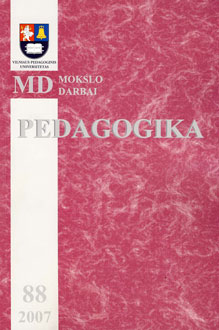Tautos tradicijos daraktorių veikloje, formuojant vertybių sistemą
The Lithuanian Nation's Traditions in Activity of Daractors in Formation the Value System of Young Generation
Author(s): Rimantas VaivadaSubject(s): Education
Published by: Vytauto Didžiojo Universitetas
Keywords: daractor; educational activity; national traditions; school children's; spiritual values; pedagogy.
Summary/Abstract: The pedagogy of the end of the 19th and the beginning of the 20th century is clearly defined in this article as transfer of our nation (peasants') educational experience from generation to generation, as the source of moral knowledge and the spiritual values of our society. We aimed at revealing indications of national traditions in the educational activity of "daractors" (writers and other representatives of intelligentsia), their influence on the national Lithuanian education system in the aforesaid epoque. Nowadays the students of higher pedagogical schools can derive not only self-respect but also wisdom from the model of educational activity of such "daractors" and writers as s. Kušeliauskas, m. Valančius and žemaite. The educational activity of writers and other representatives of intelligentsia involved two types of the non-official education system at that time, i.e. Mother's school and "daractors"' school. The contents of training provided by "daractors" was rather broad: reading and writing in lithuanian, counting, geography, history, handicrafts, religion, chanting, singing, dancing folk dances in barns, performing in barn theatres. The extent of training contents depended on the education of the "daractors" themselves. The distinguishing feature of writers and "daractors" was that they not only taught children many subjects in lithuanian at a secret school but also showed this teaching in their fiction writings, they wrote plays for barn theatres and prepared text-books. The theoretical and practical novelty of the "daractors" pedagogical heritage research could be defined as revelation of the educational influence of the "daractors" (writers and other representatives of intelligentsia) upon moral culture of the lithuanian nation in the epoque mentioned above and this tendency of their educational activity is so important for perfection of the present-day lithuanian education system. The personalities of "daractors" and writers had an especially important effect on development of the pedagogical thought in Lithuania. In addition a role of religion was newly revealed in the educational activity of the "daractors" in training the young generation and it manifested itself in mother and "daractors" school organization practice mainly supported by national Lithuanian traditions and customs. The educational activity of the "daractors" can be considered as a natural model for formation and perfection of the present-day educational policy and training teachers.
Journal: Pedagogika
- Issue Year: 2007
- Issue No: 88
- Page Range: 13-18
- Page Count: 6
- Language: Lithuanian

